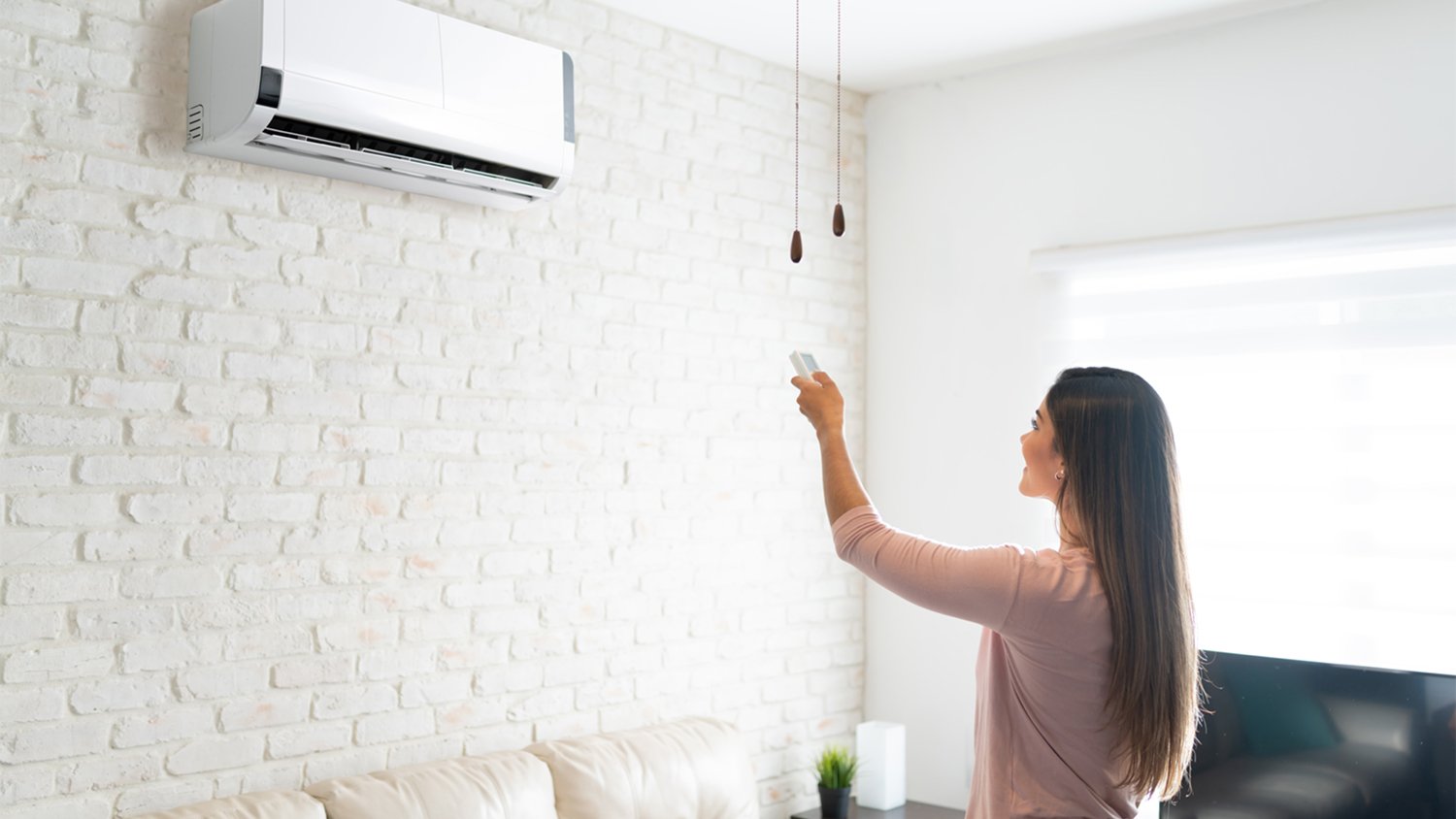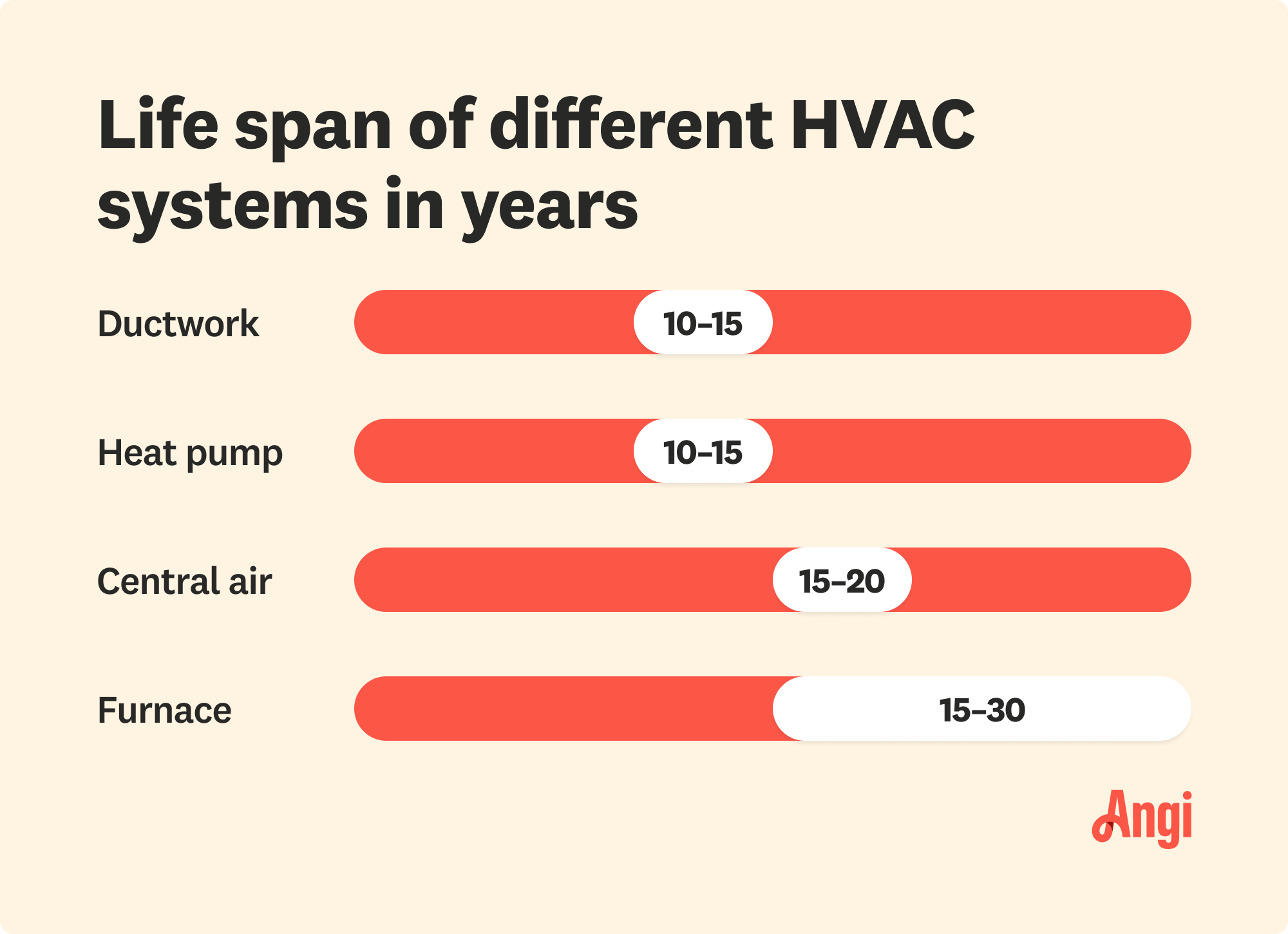Does a New HVAC System Increase Your Home Value?
Make your HVAC decision a breeze


Home Value Rating: 2/5
Installing a new HVAC system can add some value with a pro’s expertise and make your home more appealing to potential buyers.
A new HVAC can raise your home’s value by 5% to 7%.
Benefits of a new HVAC unit include energy efficiency, tax benefits, and a higher home appraisal.
A new HVAC unit costs anywhere from $5,000 to $10,000.
If you’re on the fence about replacing your home’s heating and cooling system, you’re likely wondering whether installing a new HVAC system will increase your home value. If you live in an older home or your current HVAC system is on the outs, a new system can help heat and cool your home more efficiently and boost your home’s value. Let’s review how a new HVAC system affects your home’s value, and when to hire an AC installer to get started.
Will Installing a New HVAC System Increase Home Value?
Yes, installing a new HVAC system can increase your home value by 5% to 7% with a return on investment (ROI) of about 30%. This projected increase is especially true if you replace your current setup with an energy-efficient system, providing additional benefits to future buyers in the long run. Potential home buyers will view a new system as a money saver on electricity bills and lower maintenance costs for at least 10 to 15 years. Consult a local AC installer about the best time to replace your HVAC system before selling your home.
Factors That Influence HVAC Value
The ROI of your HVAC system depends on several factors, such as the type of HVAC you install and its energy efficiency. Here are the different factors that determine your HVAC's impact on home value.
Location and Climate
In hot climates, you’ll see significant resale value in installing an efficient air conditioning unit, helping you and future owners save on energy costs. In colder regions, upgrading your heat pump or furnace will reap better ROI. Not only will these upgrades increase your home’s value, but they’ll also make the home more comfortable and appealing to buyers.
Energy Efficiency
The higher the SEER rating on your HVAC systems, the more energy efficient they are (and the lower your energy bills). A good SEER rating for an air conditioner is 15 to 16, and a good SEER rating for a furnace is 15 to 20. These higher ratings mean lower ongoing operating costs, increasing your home value to buyers.
Smart thermostats also increase your HVAC’s energy efficiency—and ROI—by offering zoning capabilities and scheduled settings to maximize energy savings.
Sustainability
More and more homeowners are concerned and invested in reducing their carbon footprint. A more up-to-date and energy-efficient HVAC system appeals more to buyers who care about sustainability.
HVAC Type
Because HVAC systems range in type and function, the ROI depends on the type of HVAC system you install.
| HVAC Type | Average Boost to Home Value |
|---|---|
| Heat pumps | $1,260–$2,280 |
| Central air conditioning | $1,170–$2,370 |
| Geothermal systems | $1,300–$7,300 |
| Ductless mini-splits | $600–$4,350 |
DIY vs. Hiring a Pro
For an HVAC system to reap its full ROI—or any ROI at all—it must be installed by a qualified local HVAC installer. Improper installation can lead to poor performance, inefficient heating and cooling, and more frequent repairs. A licensed tech ensures proper sizing, ductwork design, installation, and overall performance.
Not to mention, installing an HVAC system is not a DIY project because it poses a huge safety risk. Improper electrical wiring and handling of refrigerant can be hazardous. Some manufacturers even void warranties if a licensed professional doesn’t install and repair the HVAC system.
How a New HVAC System Increases Home Value

A new HVAC system will boost your home’s appeal and value to potential buyers in a few important ways.
Energy Efficiency
New HVAC systems are more energy-efficient than older models, leading to major savings on your monthly energy bills. Reduced costs over time equal more money in your (or future homeowners’) pockets for other home improvements. Plus, potential home buyers may appreciate that your HVAC system has a lesser environmental impact than older, outdated models.
Tax Benefits
Investing in a new HVAC system means extra rebates, plus potential tax deductions of up to 10% of the installed costs. While potential home buyers won’t get to share in the rebate payments, you can appreciate the tax benefit that can offset the cost of installing a new HVAC system.
Higher Home Appraisal
When selling your house, a home appraisal by a professional determines what your home is worth and what potential buyers should pay for it. A professional home appraiser will likely consider your property worth more if its systems are updated with the newest appliances, such as a new HVAC unit. Since HVAC units are big-ticket investments, appraisers will highlight a recent installation in their appraisal.
What Kind of ROI Can I Get on My HVAC Investment When I Sell My Home?
The ROI on an HVAC system investment depends on how much value it adds and how much you paid for it. For example, if you spent $10,000 on HVAC upgrades before selling your home, and it adds about $2,500 to $3,000 to the sale price of your home, your ROI will be 25 to 30%. You are less likely to see a full return on your investment right away unless it’s a seller’s market, and demand for your home drives the price and value of a new HVAC up significantly.
How Much Does It Cost to Install a New HVAC System?

A new HVAC system costs anywhere from $5,000 to $12,500, depending on where you live, its size and age, and the brand. The type of HVAC system will also impact the cost, from duct-free to hybrid. The average price for a new system is $7,000 for materials and $1,500 for labor. There may be additional costs for additional tasks, including adding zones, installing a new thermostat, and including humidity controls.
Signs You Need a New HVAC System

Since most HVAC systems last about 10 to 30 years, older appliances will start to break down over time. Here are some signs to watch out for that may indicate you need a new HVAC system:
Heating:
Uneven heating
Decreased efficiency
Pilot light comes on
Evidence of rust, corrosion, or cracks
Higher levels of carbon monoxide
Cooling:
Refrigerant leaks
Inconsistent cooling
High humidity levels
Requires frequent repairs
Hissing sounds
Higher energy bills
One or more of the signs listed above could mean it’s time to look into purchasing a new HVAC system. If you’re unsure which type to buy, you can hire an air conditioner installer near you to inspect your current system and recommend a replacement.
How Angi Gets Its ROI Data
Home is the most important place on earth, which is why Angi has helped more than 150 million homeowners transform their houses into homes they adore. To help homeowners maximize the value of their investments, we gather ROI data from reputable sources, including industry reports, real estate studies, and interviews with market experts. We calculate the average resale value for projects by multiplying the ROI against the project’s average cost according to our cost data, which is sourced from thousands of real Angi customers.
Want to help us improve our data? Send us a recent project quote or home appraisal value to costquotes@angi.com. Quotes and personal information will not be shared publicly.
Frequently Asked Questions
A new HVAC unit typically adds about $2,500 to $3,000 to the value of your home or about 5% to 7% of your home’s value. Since a new unit can cost up to or more than $10,000 to install, it’s up to you to decide if the upfront cost is worth the added value. Consult a local AC installer to determine next steps.
It depends on the individual policy of the HVAC contractor or company you hire for the quote. Some installers may negotiate the terms of your contract, such as how many years you want to pay off a loan or the percentage of your APR. You may also be able to provide comparing quotes to get the overall price down.
You can buy a house with a 15-year-old HVAC system if you inspect the system for performance and budget for a replacement within the next three years. You can also negotiate the price with the sellers. Ask to look at the unit’s maintenance records and energy bills for the last two years to determine the shape of the HVAC system and its operating costs. Spend time in each room of the house to gauge if the HVAC keeps the home at a consistent temperature throughout.





- Furnace Repair
- Air Conditioning Repair
- HVAC Repairs
- Furnace Installation
- Wood & Pellet Stove Repair
- Dehumidifier & Humidifier Repair
- Heat Pump Companies
- Swamp Cooler Repair
- Wood Stove Services
- HVAC Companies
- Commercial A/C Repair
- Geothermal Installation
- Air Conditioning Installation
- Boiler Repair
- 24 Hour Furnace Repair
- Geothermal Repair
- Heat Pump Repair
- Humidifier Installation
- Thermostat Repair
- Thermostat Installation
- Nest Installation
- Heating & Cooling
- Heating Repair
- Furnace Cleaning
- Furnace Tune-Up
- HVAC Technicians
- Subcontractors
- Furnace Maintenance
- Plumbing & Heating Companies
- Wood Stove Inspection
- Mini Split Installation
- Wall Heater Repair
- Duct Installers










